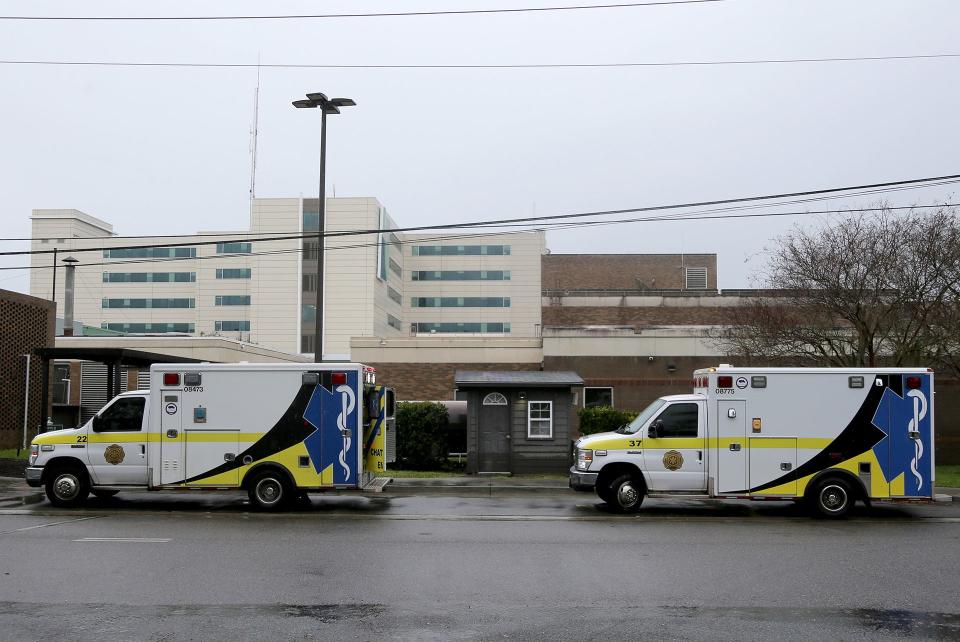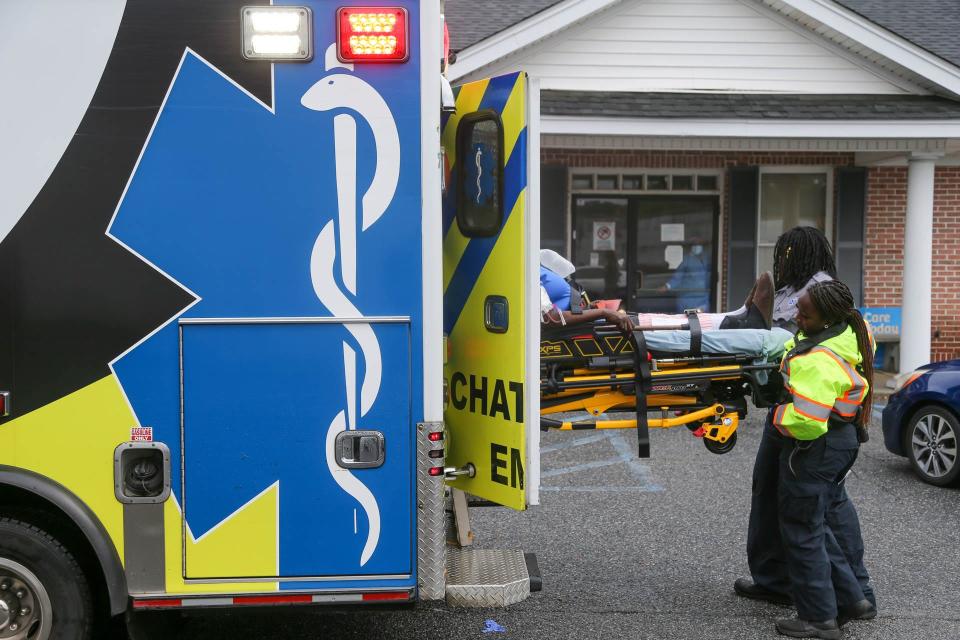No room at the ER? Savannah hospitals blame rise in patients, length of stays for EMS delays
- Oops!Something went wrong.Please try again later.
Multiple stressors have pushed emergency response times in Chatham County to 17 minutes, 30 seconds. Among them is hospital bed delays, also known as “wall time.”
When an ambulance arrives at the hospital, the paramedic or EMT cannot leave until they hand off the patient or, in other words, when a bed is available. This strands ambulances and emergency responders at hospitals for long periods. According to statistics provided by Chatham County's ambulance provider, Chatham Emergency Services, the average wall time when the ER is full is nearly 63 minutes.
An EMS emergency: Why Chatham ambulance response times are alarming lawmakers, city officials

The wait for available beds has increased exponentially since the pandemic, according to Chatham Emergency Services and officials from Savannah-area hospitals.
“Pre pandemic … we didn’t have wall time. I mean it existed. Once in a blue moon, you brought a patient in and they were cleaning the room and you wait a minute,” said Phil Koster, Chatham Emergency Services' chief operating officer. “During the pandemic, with the volume of patients, we had patients in ambulances underneath the canopy for hours at a time because there was physically nowhere to put them.”
Hospital bed delay summary | Count | Hours delayed | Average minutes per ambulance |
January 2020 | 0 | 0 | 0 |
January 2021 | 357 | 366 | 61.5 |
January 2022 | 302 | 286 | 56.8 |
January 2023 | 493 | 517 | 62.9 |
In the most extreme cases, CES has had 12 ambulances ― nearly a third of their fleet ― stuck at a hospital while they wait for a patient to get a hospital bed.
While COVID-19 infections and hospitalizations have waned since the height of the pandemic, ambulance services and hospitals are still being overwhelmed.
“Since the pandemic, the system has remained in a pandemic state even though COVID isn’t here,” said Koster.
Sicker patients creating hospital logjam
Savannah’s two hospital operators, St. Joseph’s/Candler and Memorial Health University Medical Center, acknowledge that there’s an issue with capacity leading to bed delays.
St. Joseph’s/Candler President and CEO Paul Hinchey says the issue is multifaceted. Each of the two hospitals now has 54 ER treatment spots, an increase of 15 beds at Candler and 20 beds at St. Joseph's compared to early 2020. The space is needed as the number of emergency room patients who are admitted to the two hospitals - and not immediately discharged after treatment - has increased by more than 500 a year.
'Forced to do more with less.' How the complexities of the EMS business affects response times
The health care provider has expanded staffing to keep up with the influx - St. Joseph's currently has more staff today than before the pandemic while Candler staffing has reached pre-pandemic levels - but still feels the pressure.
“We’re getting sicker and sicker patients,” said Hinchey. “They’re not coming in with COVID, but they sure are coming in with past effects of having COVID, and this is still being studied.”
Those patients are arriving at higher rates and staying for “longer than normal.”
“Going on the days when a patient would come to the hospital for a two-day rest so to speak, that does not happen anymore,” said Hinchey. “If you go down to the ICU, you may find two or three patients in there that are responsive. The rest of them are too sick and are unresponsive.”

Hinchey also points to larger trends in public health. Across the nation, drug overdoses have increased steadily over the past two decades, and in Chatham County, the trend is no different
In the last year, the hospital has also seen more psychiatric patients. St. Joseph’s Hospital has seen a 37% increase in psychiatric patients since the beginning of the pandemic, while Candler Hospital has experienced a 16% uptick.
Meanwhile, Savannah's designated trauma hospital, Memorial Health University Medical Center, intends to expand ER capacity by opening new care sites. However, the health care system is currently waiting for state approval for two freestanding ERs ]in Pooler and in Richmond Hill. The care sites would be open around the clock and staffed with board-certified emergency physicians and emergency-trained nurses.
“Our goal is to bring emergency care closer to residents in these communities so they can receive care faster. Our freestanding ERs would reduce travel time for local EMS teams and get them back on the road to take other calls,” read an email statement from Memorial Health.
However, St. Joseph/Candler's Hinchey stressed that the problem runs deeper than staffing shortages and bed shortages. To understand why hospitals are overwhelmed, leading to longer wall times for ambulances, one has to look at why the volume of patients are increasing.
“It’s a public health issue,” said Hinchey, “These patients are now coming to acute care hospitals where we haven’t seen that to that degree a year ago. But we sure are seeing it now.”
This article originally appeared on Savannah Morning News: Savannah hospitals cite increase in sicker patients for bed delays

